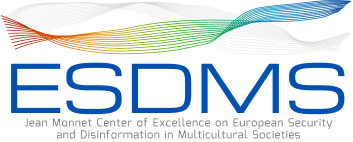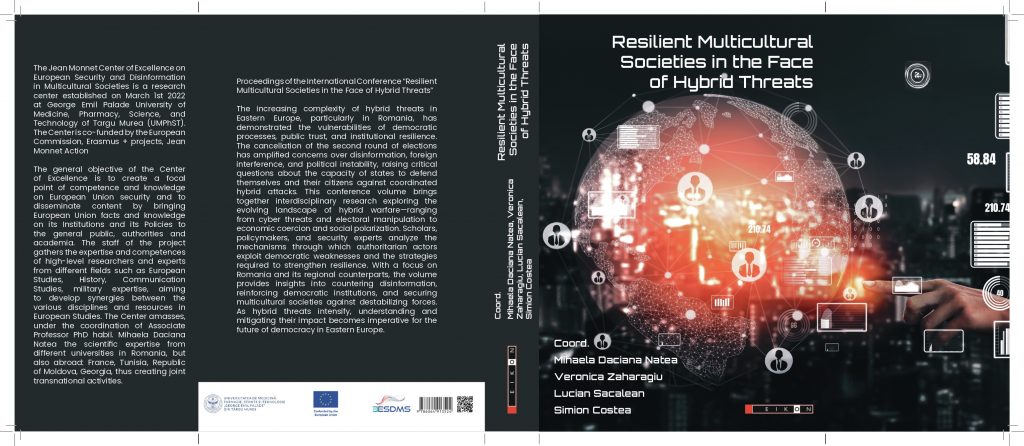
The increasing complexity of hybrid threats in Eastern Europe, particularly in Romania, has demonstrated the vulnerabilities of democratic processes, public trust, and institutional resilience. The cancellation of the second round of elections has amplified concerns over disinformation, foreign interference, and political instability, raising critical questions about the capacity of states to defend themselves and their citizens against coordinated hybrid attacks. This conference volume brings together interdisciplinary research exploring the evolving landscape of hybrid warfare—ranging from cyber threats and electoral manipulation to economic coercion and social polarization. Scholars, policymakers, and security experts analyze the mechanisms through which authoritarian actors exploit democratic weaknesses and the strategies required to strengthen resilience. With a focus on Romania and its regional counterparts, the volume provides insights into countering disinformation, reinforcing democratic institutions, and securing multicultural societies against destabilizing forces. As hybrid threats intensify, understanding and mitigating their impact becomes imperative for the future of democracy in Eastern Europe.
The book was published within the framework of the Jean Monnet Center of Excellence in European Security and Disinformation in Multicultural Societies project, implemented by UMFST and co-financed by the EU through the Jean Monnet action.
Funded by the European Union. Views and opinions expressed are however those of the author(s) only and do not necessarily reflect those of the European Union. Neither the European Union nor the granting authority can be held responsible for them.
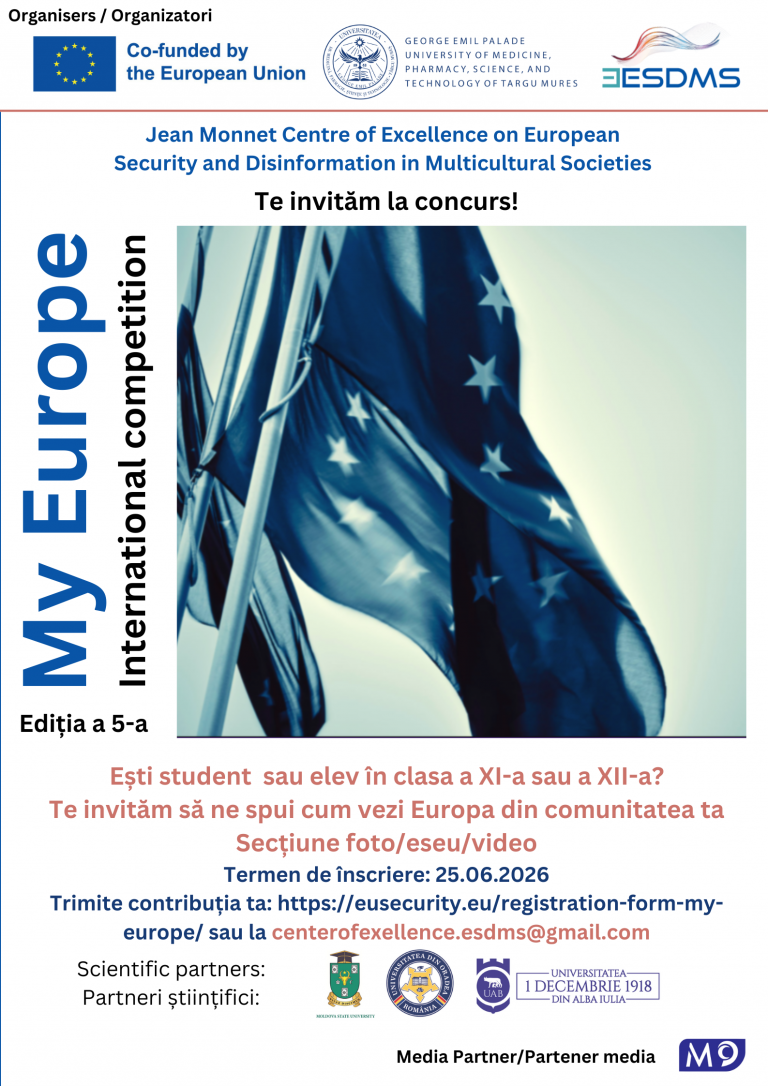
My Europe/Europa Mea – pdf
The objective of this activity was to develop the sense of a European identity among the young generation, as well as to help understand the idea of a United Europe. In accordance with the fundamental principle of the European Union, “Unity in Diversity”, the main objective of the event was to increase the sense of belonging to the EU, as dual citizens: Romanians and Europeans, by identifying local and European identity traits. The present document recollect selected photos and essay from the three editions of the contest.
Scopul activității a fost dezvoltarea sentimentului de identitate europeană în rândul tinerei generații, precum și înțelegerea ideii de Europa Unită. În concordanță cu principiul fundamental al Uniunii Europene, “Unitate în diversitate”, obiectivul principal al evenimentelor este acela de a crește sentimentul de apartenență la UE, ca dubli cetățeni: români și europeni, prin identificarea elementelor identitare locale și europene. Documentul atașat reprezintă o selecție a materialelor prezentate in cele 3 ediții ale concursului
The book was published within the framework of the Jean Monnet Center of Excellence in European Security and Disinformation in Multicultural Societies project, implemented by UMFST and co-financed by the EU through the Jean Monnet action.
Funded by the European Union. Views and opinions expressed are however those of the author(s) only and do not necessarily reflect those of the European Union. Neither the European Union nor the granting authority can be held responsible for them.
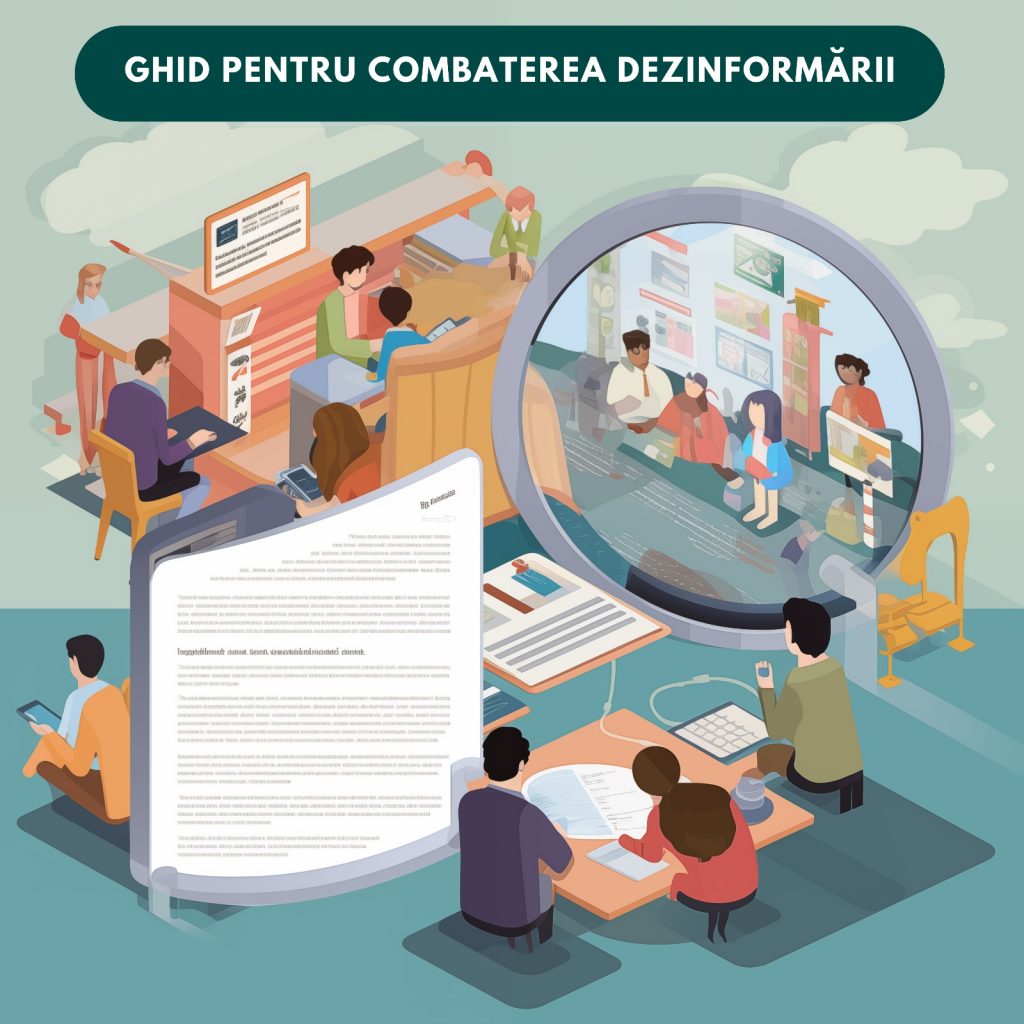
Combaterea dezinformării este cu certitudine o preocupare la nivel internațional organizațiile internaționale fie cu vocație universală fie de integrare încercând să dezvolte să promoveze și să integreze în activitatea lor metode de bune practici în combaterea dezinformării. Ele sunt de cele mai multe ori legate de politicile de comunicare strategică, StratCom, dar și de politicile educaționale și alte tipuri de politici care pot contribui prin activitatea lor la combaterea dezinformării. Acest subiect l-am abordat pe larg și poate fi regăsit în volumul Redefining European Security in a Post COVID-19 World apărută la editura L’Harmattan în 2023.
Ghidul este construit pentru a servi instituțiilor locale în definirea unei strategii pentru combaterea dezinformării.
The present volume is published with the support of the European Union and represents a deliverable within the EU project Jean Monnet Center of Excellence is European Security and Disinformation in Multicultural Societies – no. 101047907 – ESDMS, Erasmus+. The sole responsibility of this publication lies with the author. Funded by the European Union. Views and opinions expressed are however those of the author(s) only and do not necessarily reflect those of the European Union. Neither the European Union nor the granting authority can be responsible for them
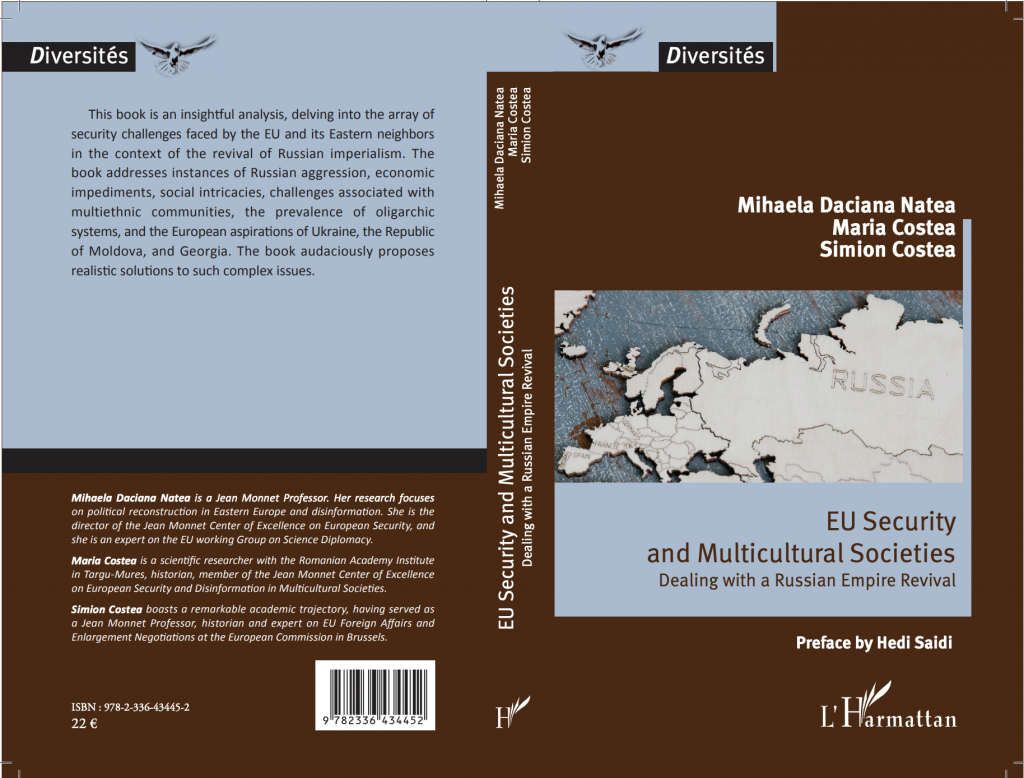
Mihaela Daciana Natea, Maria Costea, Simion Costea
EU Security and Multicultural Societies Dealing with a Russian Empire Revival
EU Security and Multicultural Societies. Dealing with a Russian Empire Revival– pdf
The present volume is published with the support of the European Union and represents a deliverable within the EU project Jean Monnet Center of Excellence is European Security and Disinformation in Multicultural Societies – no. 101047907 – ESDMS, Erasmus+. The sole responsibility of this publication lies with the author. Funded by the European Union. Views and opinions expressed are however those of the author(s) only and do not necessarily reflect those of the European Union. Neither the European Union nor the granting authority can be responsible for them
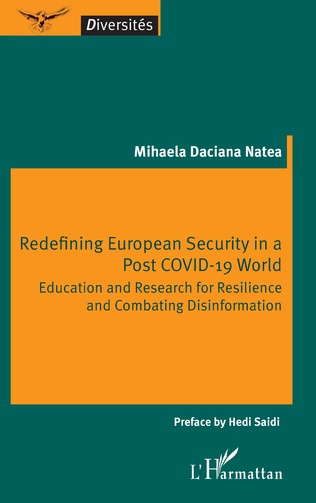
The present volume is published with the support of the European Union and represents a deliverable within the EU project Jean Monnet Center of Excellence is European Security and Disinformation in Multicultural Societies – no. 101047907 – ESDMS, Erasmus+. The sole responsibility of this publication lies with the author. Funded by the European Union. Views and opinions expressed are however those of the author(s) only and do not necessarily reflect those of the European Union. Neither the European Union nor the granting authority can be responsible for them
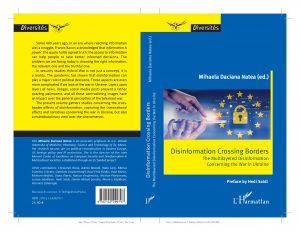
The Multilayered Disinformation Concerning the War in Ukraine – pdf
Mihaela Daciana Natea, Is the EU Strategic Communication Good Enough? Why does the War in Ukraine Prove the Need for a More Complex Approach Towards Disinformation?
Hedi Saidi, La Laïcité Est-Elle Opposée A La Religion ? Comment Se Former A La Laïcité?
Chrysotea Basia, Radu Carp, National Minorities in the Odessa Oblast: a Model of Coexistence or Tensions Ahead?
Lucian Săcălean, A Romanian-Hungarian Multiethnic Communitie – Reactions to Newcomers. Case Study – Ukrainian Refugees
Monica Săplăcan, Psychological Factors of the Response to the Ukrainian Crisis – Multi-Ethnic Community and Ukrainian Refugees
Gabriela Goudenhooft, Free Speech, Hate Speech and the Security of the European Union
Marius Dumitru Crăciun, Information and Disinformation in the Ukrainian War
Ploeșteanu Nicolae; Raul Miron, Dissolutions and Assumptions Close to Fake News Over Evidence Suggesting War Crimes in Ukraine. Case Study: Amnesty International Report
Oana Olariu, Raul Felix Hodos, Raluca Onufreiciuc, Deepfake as Political Weapon. Local Representatives Becoming Targets as Well
Daniel-Mihail Șandru, The Principles and Procedures of Personal Data Protection Used in Combating Disinformation
Nicolae Ploeșteanu, Raul Miron, Can the International Criminal Court be Used as a Source of Fake News?
Adrian Boantă, Fake News and the Act of Justice
Veronica Zaharagiu, Propaganda, Between Literature and Ideology
Mohsen Neffati, Histoire Et Mémoire. Les Chemins de la Transmission?
The present volume is published with the support of the European Union and represents a deliverable within the EU project Jean Monnet Center of Excellence is European Security and Disinformation in Multicultural Societies – no. 101047907 – ESDMS, Erasmus+. The sole responsibility of this publication lies with the author. Funded by the European Union. Views and opinions expressed are however those of the author(s) only and do not necessarily reflect those of the European Union. Neither the European Union nor the granting authority can be responsible for them.


